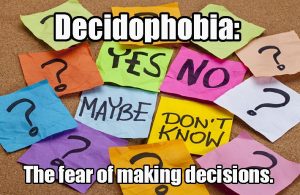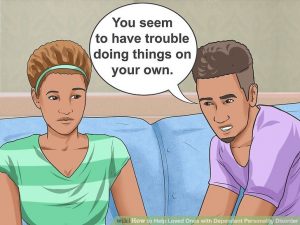Walter Kaufmann, Princeton University philosopher coined the term decidophobia in his 1973 book “Without Guilt and Justice” in which he wrote about the phenomenon at length. The cause of decidophobia is usually a bad experience with decision making in the childhood, or to be ruled by a dominating person from childhood. Such a person suffers low self esteem and prefers maintaining status quo of whatever the dominating or strong person says or does. Decidophobia makes a person dependable on others for even making small decisions in life.
We make an average 35,000 conscious decisions a day as adults, and children make approximately 3,000 decisions a day! These figures are based on multiple sources on the Internet. Some of our decisions are impulsive and some are logical. So you see we make decisions practically each moment in a day. Some are quick, some are simple, and some are difficult, each decision, no matter big or small, can affect our life in long run. But, it’s important to make decision based on our own instinct. If we depend on someone else’s notion to made decisions of our life, some day the dependency costs us hell of a lot.
Making choices and decisions are an important element of life. Based on our decisions life unfolds, with its twists and turns. Some decisions might be correct and some wrong, some might start a new chapter and some might just stop things. Some decisions bring fascination in life and some baffle us to no end. From childhood to adulthood a person masters the art of decision making. Some people can just dive into life and do what is necessary with eagerness and excitement while others get paralyzed at the thought of having to step up to anything that might require taking action. Whether we like it or not, we need to take umpteen decisions in life….some good, some bad and some ugly. Our instincts are based on our mental, physical and spiritual wellbeing.
But, we see lot people in our lives that depend for small, small decisions on somebody else. Indeed, some people are so dependent on others because they feel that their lives are out of their control. The dependency can be for anybody; it can be a sibling, children, parent, spouse, friend, a boss, a neighbour, it can be anybody. But, these dependent people feel lost, confused while taking vital decisions. And, the worst part is a person gets lost, demoralised when the person on whom he/she depends, goes away from life. I have seen this very closely: these two sisters were very close to each other, the younger sister who is single, was completely dependent on her elder sister in all of her decision making, for even the smallest of decisions. Small decisions such as which colour dress to buy, what cost, from whereat to buy; what to cook, how much to cook; which doctor to visit in case of ailment, whether to go to doctor or to take home remedy; where to invest her salary, how much to spend, how much to save …….the list is big. Recently, when the elder sister passed away, this younger sister felt a big void in life, so much so that she started feeling hallucinated about her sister’s presence.
To be your own person you undoubtedly require independence of thought, feeling, and actions. You must think, feel, and act without terribly relying on others to give you directions in your life. Though as humans we are social animals, and we cannot live in vacuum, one thing is crystal clear that we eat, educate, and earn a living for ourselves. So, being independent does not mean that you live outside cultural, social, and legal boundaries; social conformity is essential, but not at the cost of independent thinking, independent decision making.
Often we get tempted to depend on a person or people in our relationships. But the key is to not become vulnerable; we must learn to play our role with clarity. Too much of dependability only weakens our daily decision making without somebody’s advice and support. We get habituated to leaning on others easily.
Dependable people need others to assume responsibility for many major areas of life. They have difficulty to disagree and to contradict with others out of fear. They get used to other’s dictating their life.
Dependent people fear exposure; they become shy, and hate confrontation of any sort. They literally live in a shell. They don’t like meeting and mixing with others, and overall have weaknesses of public display. Slowly, such people avoid failure by evading of taking any initiative. They limit their interactions to such an extent that they run away from any interactions where they need making some decisions. They feel anxious or distressed when alone or when thinking about being alone. These weak people often expect the worst. They do not feel capable of living their own lives without others.
For them, facing problems becomes overwhelming. Dependent people wholeheartedly believe in Murphy’s Law: Anything that can go wrong will go wrong. The concept was coined and named after Capt. Edward A. Murphy; an engineer working on Air Force Project MX981, (a project) designed to see how much sudden deceleration (reduction in speed rate) a person can stand in a crash. It is we who keep using the adage when things go out of control.
Weak people make themselves responsible when bad things happen. Because, they don’t trust themselves, they don’t respect themselves therefore, they feel guilty for mistakes. Even if the conclusion is unreasonable, they take the blame for all wrongdoing, event, and circumstances. This they do because they feel responsible for fulfilling the expectations of others. In dependency, the dependent person adopts the expectations of the other person as their own. So when the dependent person fails, they fail to meet not only the expectations of the other person but also their own. Each failure strengthens the dependent person’s destructive judgment of self.
Dependent people have a high need for validation and approval from others. They crave for validation badly; such a person naively creates or defends personal boundaries. The only real boundary a dependent person has is to be within the boundary of a desired relationship. Apart from that, all other personal boundaries are fluid and flexible in order to maintain the desired relationship. An eagerness to negotiate personal boundaries for a relationship creates helplessness.
There are the cunning and crafty people out there who only e xploit this type of vulnerability. They are all-too-willing to find out how much a dependent person can be exploited. Some rich people leave a big fortune for their children behind them, who have never taken decisions of their own; such people get exploited after their parents exit the world. They inherit family fortune and then they get exploited by wicked people around them.
xploit this type of vulnerability. They are all-too-willing to find out how much a dependent person can be exploited. Some rich people leave a big fortune for their children behind them, who have never taken decisions of their own; such people get exploited after their parents exit the world. They inherit family fortune and then they get exploited by wicked people around them.
If you or some near and dear is suffering from decidophobia, get rid of it as immediate as possible. If required take professional help without hesitation.















































